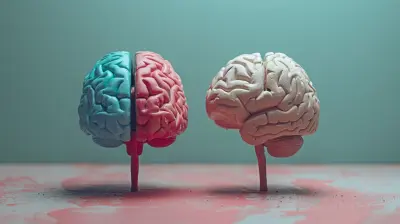The Power of Self-Compassion: A Path to Inner Peace
8 October 2025
In today’s fast-paced, high-stress world, we often find ourselves being our own harshest critics. From the moment we wake up, we’re bombarded with thoughts about what we should be doing, what we could have done better, or how we don’t measure up. Sound familiar? You’re not alone. But here’s the thing — constantly beating ourselves up isn’t doing us any favors. In fact, it’s actually harmful.
That’s where self-compassion comes in. If you’re looking for a way to ease the endless mental chatter and find some inner peace, self-compassion might just be the key. Let’s dive into why this concept is so powerful, how it can transform your life, and most importantly, how you can cultivate it.
What Exactly Is Self-Compassion?
Before we get too far, let’s take a step back and define what we mean by self-compassion. Simply put, self-compassion is treating yourself with the same kindness and understanding that you would offer to a good friend.Think about when a close friend comes to you upset, feeling like a failure. What do you do? You probably reassure them, offer support, and remind them that everyone makes mistakes, and it’s okay. But when was the last time you did that for yourself? If you’re like most people, probably not often enough.
Self-compassion involves three main components, according to Dr. Kristin Neff, a pioneer in this field:
1. Self-Kindness: Being warm and understanding toward ourselves when we suffer, fail, or feel inadequate, rather than ignoring our pain or being overly self-critical.
2. Common Humanity: Recognizing that suffering and personal inadequacy are part of the shared human experience – something we all go through, rather than something that happens to “me” alone.
3. Mindfulness: Taking a balanced approach to our negative emotions so that feelings are neither suppressed nor exaggerated. We observe our thoughts and feelings as they are, without judgment.
The Science Behind Self-Compassion
It’s all well and good to talk about being kind to yourself, but does it actually make a difference? The answer is a resounding yes! Over the past decade, numerous studies have shown that self-compassion has incredible mental health benefits.Reduced Anxiety and Depression
One of the most well-documented benefits of self-compassion is its positive impact on anxiety and depression. People who practice self-compassion are less likely to fall into the trap of rumination or worrying endlessly about their perceived failures. Instead of letting negative thoughts spiral out of control, self-compassion allows us to acknowledge them without being overwhelmed.In fact, research has shown that individuals with higher levels of self-compassion experience less anxiety and depression, even in the face of stressful life events. And it makes sense, right? When we stop beating ourselves up, we reduce the emotional toll these events take on us.
Greater Emotional Resilience
Self-compassion also boosts emotional resilience. Resilience is our ability to bounce back from adversity, and it turns out that being kind to yourself can make a huge difference in how quickly you recover from setbacks. When we approach failure or disappointment with self-compassion, we’re more likely to learn from the experience and move forward, rather than getting stuck in a cycle of self-blame.Better Physical Health
Believe it or not, practicing self-compassion can even improve your physical health. Studies have shown that people who are more self-compassionate have lower levels of inflammation, lower blood pressure, and even shorter recovery times after surgery. The link between mind and body is strong, and when you’re kinder to yourself, your body responds accordingly.
Why Is Self-Compassion So Hard?
If self-compassion is so great, why do so many of us struggle with it? Well, there are a few reasons.First, many of us have been taught that being self-critical is a good thing. We think that if we’re hard on ourselves, we’ll be more motivated to succeed. However, research shows the opposite is true. Excessive self-criticism actually leads to procrastination, fear of failure, and low self-esteem — none of which are conducive to success.
Another reason is that we often confuse self-compassion with self-pity or self-indulgence. But self-compassion isn’t about feeling sorry for yourself or using kindness as an excuse to avoid responsibility. It’s about recognizing your own worth and treating yourself with the same care and respect you would offer to someone else.
Lastly, some people think self-compassion is a sign of weakness. They believe that being tough on themselves will make them stronger. But again, the research shows that people who practice self-compassion are actually more resilient and better equipped to handle life’s challenges.
How to Cultivate Self-Compassion
So, how can you start cultivating more self-compassion in your life? Here are some practical tips to help you get started.1. Practice Self-Kindness
The next time you catch yourself being self-critical, pause and ask yourself: Would I say this to a friend? If the answer is no, then don’t say it to yourself either. Replace those harsh words with kinder, more supportive ones. For example, instead of saying, “I’m such a failure,” try saying, “I’m doing the best I can, and that’s enough.”2. Embrace Your Imperfections
No one is perfect, and that’s okay. In fact, it’s what makes us human! When you make a mistake, remind yourself that everyone makes mistakes. Instead of dwelling on your shortcomings, focus on what you can learn from the experience and how you can grow moving forward.3. Practice Mindfulness
Mindfulness is all about being present in the moment without judgment. When you’re feeling down or overwhelmed, take a few deep breaths and simply observe your thoughts and feelings without getting caught up in them. Recognize that your emotions are valid, but they don’t define you.4. Use Positive Affirmations
Positive affirmations can be a powerful tool for cultivating self-compassion. Try repeating phrases like, “I am worthy of love and kindness,” or “I am enough just as I am.” It might feel awkward at first, but over time these affirmations can help shift your mindset and build a more compassionate relationship with yourself.5. Take Care of Your Body
Self-compassion isn’t just about how you talk to yourself — it’s also about how you treat yourself physically. Make sure you’re getting enough sleep, eating nourishing foods, and engaging in physical activity that you enjoy. When you take care of your body, you’re sending yourself the message that you are worth taking care of.The Ripple Effect of Self-Compassion
One of the most beautiful things about self-compassion is that it doesn’t just benefit you — it also has a ripple effect on those around you. When you treat yourself with kindness, you’re more likely to treat others with kindness too.Think about it: When you’re feeling good about yourself, you’re more patient, understanding, and empathetic towards others. On the flip side, when you’re stuck in a cycle of self-criticism, it’s easy to become irritable, defensive, or even judgmental of others.
By practicing self-compassion, you’re not only creating a more peaceful inner world for yourself, but you’re also contributing to a more compassionate, connected world for everyone.
Final Thoughts: A Path to Inner Peace
At the end of the day, self-compassion is about recognizing that you are worthy of love, kindness, and understanding — just like everyone else. It’s about letting go of the unrealistic expectations we place on ourselves and embracing our own humanity.No one is perfect, and that’s okay. By practicing self-compassion, we can begin to quiet the voice of the inner critic, find peace within ourselves, and ultimately live a more fulfilling, joyful life. So the next time you find yourself caught in a spiral of self-criticism, remember this: You deserve to be treated with kindness, especially by yourself.
Self-compassion isn’t just a nice idea — it’s a powerful tool that can transform your mental and emotional well-being. So why not give it a try? After all, you’ve got nothing to lose and everything to gain.
all images in this post were generated using AI tools
Category:
Emotional Well BeingAuthor:

Eliana Burton
Discussion
rate this article
1 comments
Valeris Morrow
Self-compassion transforms pain into peace.
October 21, 2025 at 3:47 AM

Eliana Burton
Thank you for your insightful comment! I completely agree—self-compassion is indeed a powerful tool for turning our struggles into a pathway towards inner peace.


